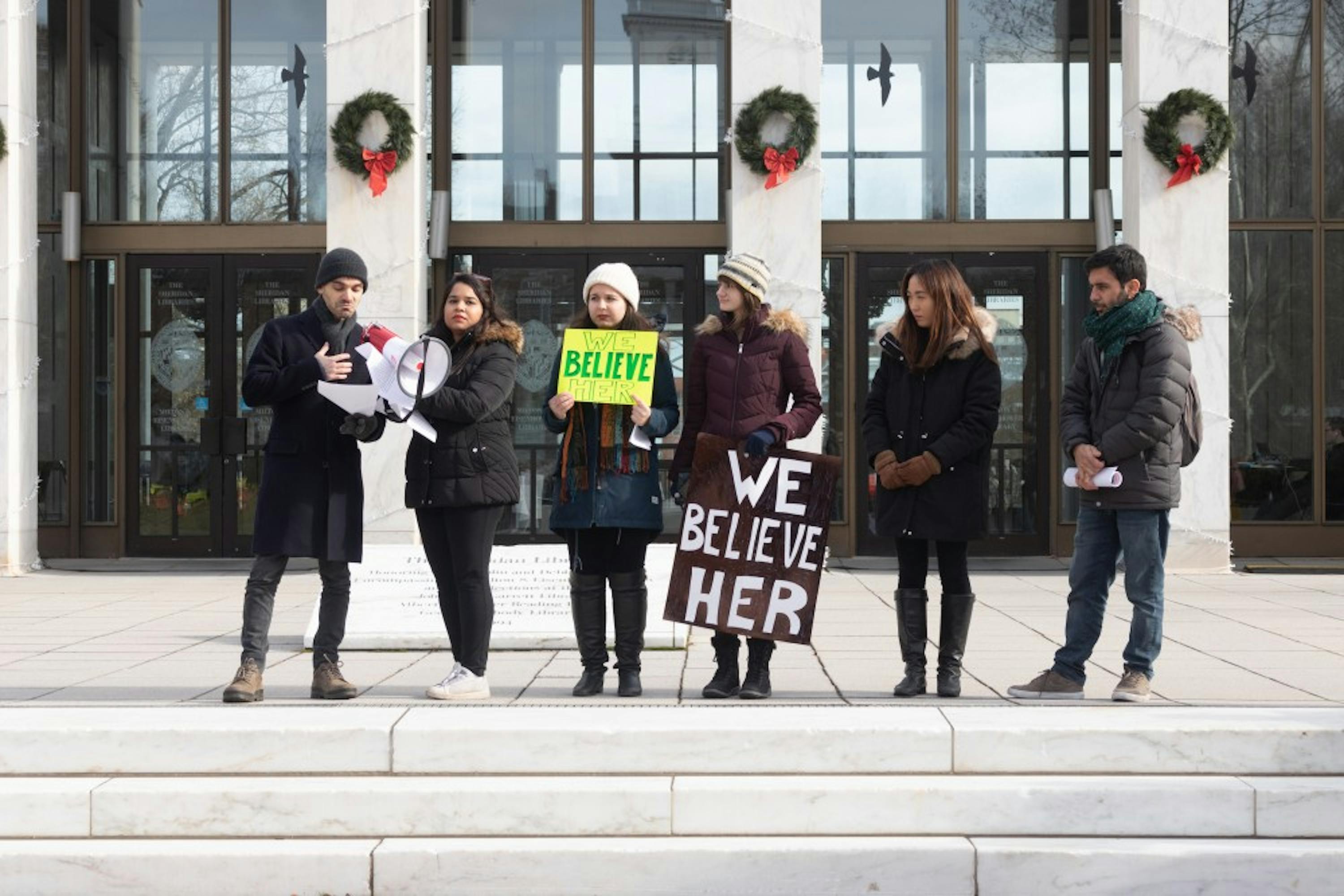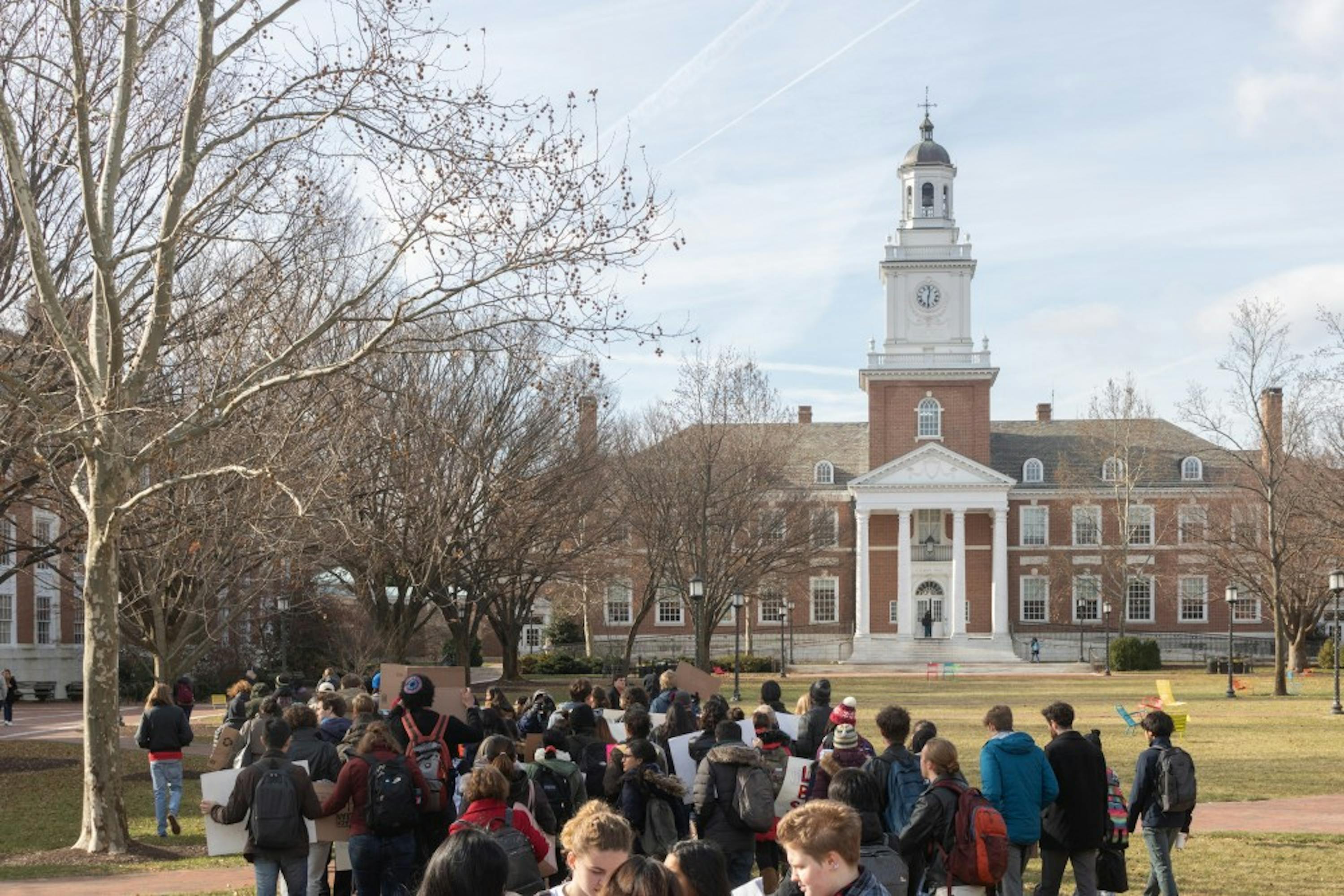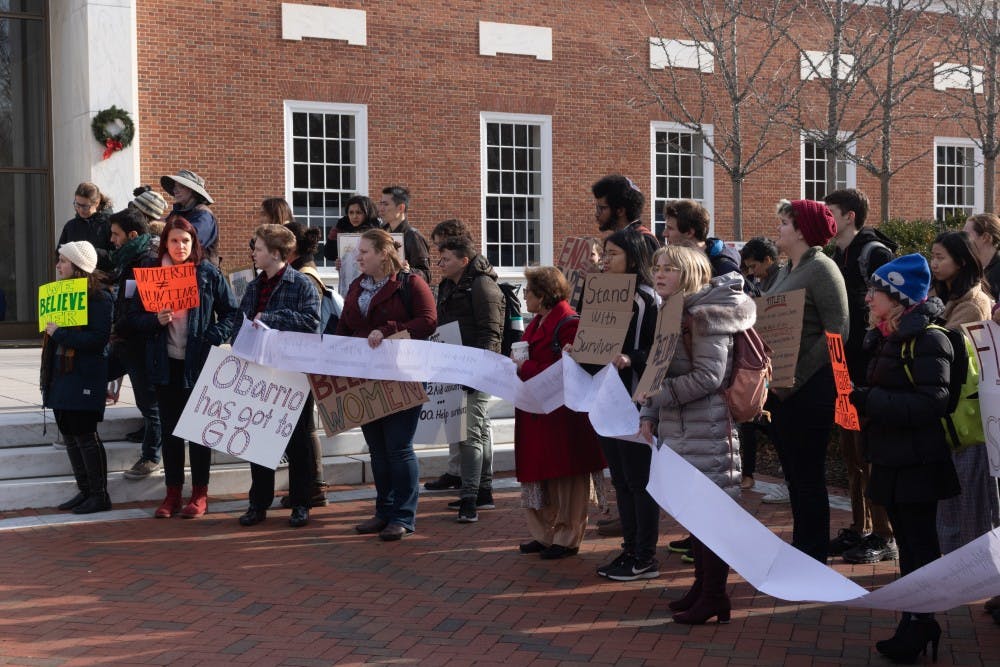Around 100 students, faculty and community members gathered outside of the Milton S. Eisenhower Library (MSE) on Thursday to demand that the University reform how the Office of Institutional Equity (OIE) handles cases of sexual violence. Demonstrators also called on administrators to take action against Anthropology Professor Juan Obarrio, who has been accused of sexually assaulting a visiting graduate student in May.
On Friday, Nov. 30 a group of student activists called #JHToo released a petition and put up flyers around campus demanding that the University fire Obarrio. The petition has garnered over 1,400 signatures to date.
Obarrio has denied the allegations. In an email to The News-Letter, he wrote that his actions and words have been distorted.
“I take the allegations very seriously,” he wrote. “I firmly reject the accusations. There is an ongoing investigation and there is no evidence for the claims included in the online petition that has been circulated.”
Outside of MSE, students shared personal accounts of their experiences with OIE. Marios Falaris and Heba Islam, two graduate students in the Anthropology department who are witnesses to the alleged assault, criticized OIE for putting Hopkins students at risk by allowing Obarrio to remain on campus.
“We are here today as witnesses, as people who saw Juan Obarrio’s assault with our own eyes,” Islam said. “Today we want to focus not on the violence we witnessed, that we’ve had to repeat over and over to various administrators. Instead, we want to focus on what that violence set in motion. When we reported the assault to the Title IX Office at Hopkins, we placed an implicit trust in what we had understood to be due process. Over and over again, however, this very Office failed us.”

Members of the #JHToo coalition criticize the OIE for mishandling investigations.
Talia Katz, an Anthropology graduate student, read a written statement from the visiting graduate student who accused Obarrio of sexual assault.
“The worst part of being sexually assaulted and harassed by a faculty member from a prestigious university is not the nightmare that you will re-live every night, nor is it the misplaced shame that you will inevitably feel. Neither is it the nausea that swells inside of you when your trauma is not taken seriously by the educational system that you have dedicated your life to,” the statement read. “The worst part is when you realize that your worth and value in academia is not based on your research or contributions, but as a sexualized object, something that can be grabbed, touched, and gazed upon for the pleasure of others.”
The visiting graduate student continued, emphasizing that tenure protects those in positions of power to the extent that academia has become a haven for sexual predators.
“The blatant ambiguousness of JHU’s definition of ‘sexual assault,’ and OIE’s superficial interpretation of it, allows for figures of authority at JHU to pick and choose at their own discretion why and how only some body parts can be sexually violated,” the statement read.
Junior Madelynn Wellons, who is a survivor of sexual assault, shared her experiences reporting to OIE. Wellons was sexually assaulted and stalked during the fall of her freshman year and said that going through the reporting process was full of “pain and trauma.”
Wellons added that OIE changed the deadline by which they would send her the case report 14 different times. Each time a new deadline was announced, she would feel panicked and terrified in anticipation of what the report might reveal. When OIE finally released the report, which found the perpetrator responsible, he had already transferred to a new school.
“I believed in the University. I believed in the system that would protect me. And I was so wrong,” she said. “My case lasted almost a year and a half at Hopkins. I’m a junior, and when this semester ends, it will be my first full semester without an OIE case hanging over my head. This messed up my academics because when you share a campus with someone who assaulted you, you can’t possibly feel safe.”
Reflecting on the statistics from OIE’s first annual report, Student Government Association (SGA) Junior Class Senator Miranda Bannister emphasized that OIE is becoming increasingly unprepared to help survivors.
“The number of reports coming to OIE almost doubled in 2017, from 240 to 410. They are already failing to do their job, so imagine what it’s going to look like as their caseload continues to grow,” she said. “If every survivor on this campus felt empowered enough to come forward, their office would be completely unequipped to handle it.”
Following the rally outside of the library, protesters marched to Garland Hall, where many administrative offices are located. They chanted “survivors united will never be divided” and “say it loud, say me too, JHU we’re watching you.” Inside, they presented the petition to administrators.
Physics & Astronomy graduate student Erini Lambrides described the ambiguity surrounding OIE and the University administration’s process of coming to a final decision about Obarrio.
“In the end, we don't know who is going to be in the room to make the final decision. We don't know when or who we really need to be giving this petition to. And that is why when we march from here to Garland, we are going to shout, and we are going to make our voices heard, so that they carry to every office on this campus in hopes that the person or group of people that are in charge hear it and know that we are watching and that we are waiting for JHU to do the right thing,” Lambrides said.

Protesters march from MSE library to Garland Hall.
In her speech at Garland, visiting student Adela Chelminski mentioned a recent issue with the OIE website that blocked the Office from receiving and acting on 18 reports of sexual misconduct from January 2016 through October 2018.
"It is unacceptable that, as the OIE published yesterday, they can also not receive cases conveniently," Chelminski said. "What they are telling survivors is, 'Stay quiet; don't say anything; we don't care about you; we care about our reputation; and we would rather protect an abuser than you.'"
OIE announced this problem on its website on Wednesday, Dec. 5 and wrote that it would work to fix the problem and update the crime logs.
“On behalf of the university and the staff of OIE, we are sincerely sorry for this error and for the distress it may have caused,” the website read. “Anyone who takes the step to file a report deserves and should expect timely action and response, and we are taking immediate steps to support those whose reports were mistakenly blocked.”
Freshman Reshmi Patel attended the protest and also helped post flyers around campus in the days leading up to the event. She felt that there has been a significant amount of support on campus for the demonstrators but noted that in her short time here, she has observed that her peers don’t view the OIE in a positive light.
“It’s my first semester, but I’ve already heard so many stories of people being either afraid to report because they think nothing will be done about it, or they have reported and it’s taken so many months or nothing’s happened,” she said.
Senior Tina Nguyen, who is a survivor of sexual harassment, said that her case took a year to resolve upon reporting to OIE.
“I’m here for everyone who has suffered from OIE. There’s so much suffering that can be avoided by just having these cases finished faster,” she said.
Vice Provost for Student Affairs Kevin Shollenberger was one of the administrators present at Thursday’s protest. He declined to comment when approached by a News-Letter reporter.
In an email to The News-Letter, Vice Provost for Institutional Equity Kimberly Hewitt wrote that the University would refrain from commenting on this specific investigation regarding Obarrio in order to protect the privacy of those involved.
“Johns Hopkins University has an obligation to protect the privacy of both the respondents and the complainants in all cases,” Hewitt wrote. “We take that obligation very seriously and do not comment on any specific report or investigation.”
Hewitt acknowledged that there are ways in which OIE can improve the way it handles investigations.
“At the same time, we know we still have room for improvement as we make every effort to reduce the time it takes to conduct thorough and fair investigations, to build transparency, and to ensure Johns Hopkins students, faculty, and staff are safe, supported, and heard,” she wrote.
On Monday, the Anthropology department posted a statement on its website, addressing the allegations against Obarrio.
“The Anthropology Department takes recent allegations against a member of its faculty very seriously. We support our students and share their distress with regard to this case. We also express our support for due process and look forward to the timely conclusion of this case by the university administration,” the statement read.
Katy Wilner contributed reporting.





